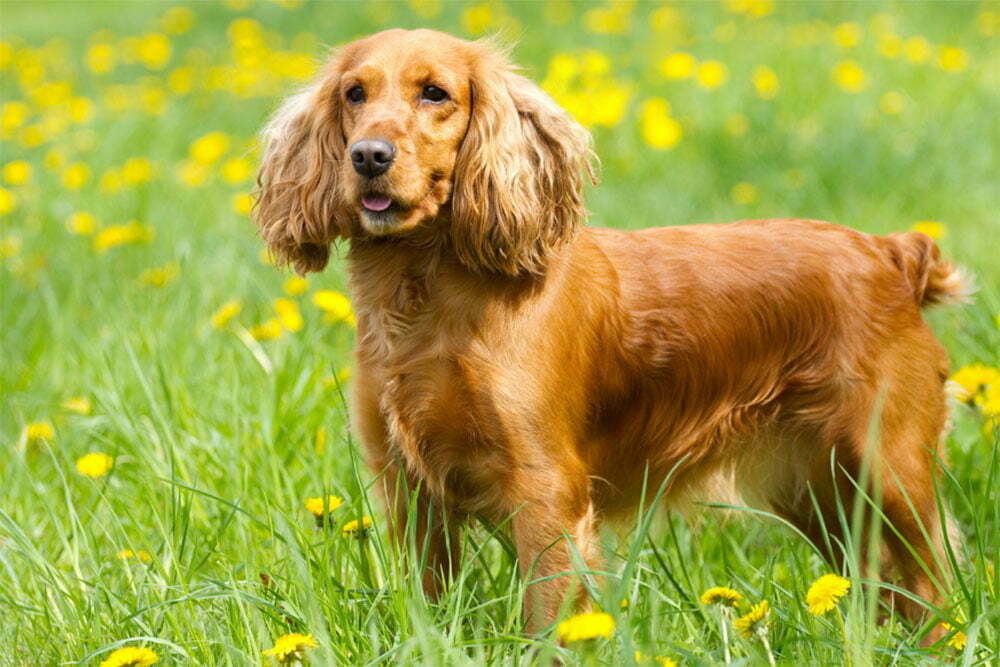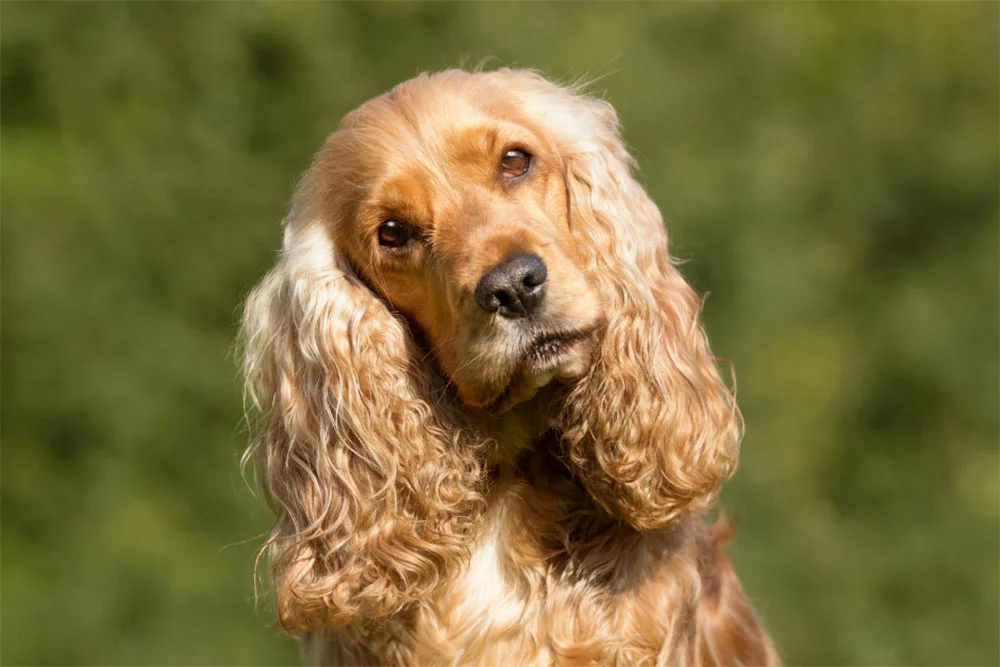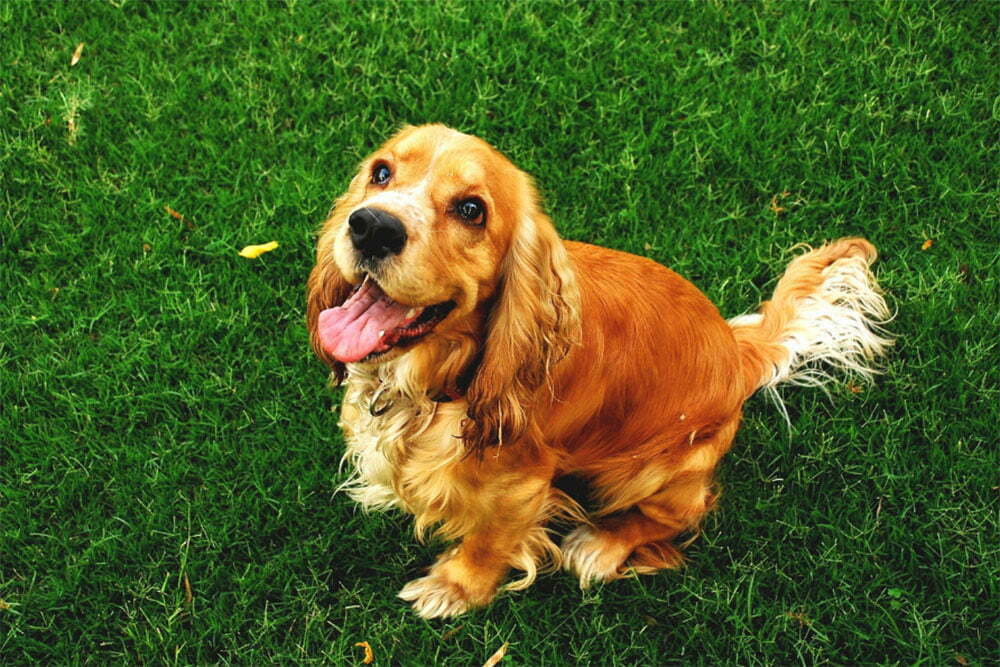Playful, affectionate, energetic – these are just some of the words that can be used to describe the Cocker Spaniel. From their humble beginnings as woodcock hunters, to one of the most popular domesticated breeds, the Cocker Spaniel is certainly an interesting and beautiful dog.

If you’ve been thinking about getting a Cocker Spaniel, educating yourself first is important.
Below you’ll find the ultimate guide to Cocker Spaniels, from their appearance to their personalities to their health, here’s everything you need to know…
Key Facts
Did you know there are two different breeds of Cocker Spaniel, the English and the American? Both dogs are very similar, but there are some slight differences. Read on to find out more about the two!
Average Lifespan
A healthy English Cocker Spaniel generally has an average lifespan of about 12-14 years and 10-15 years for an American Cocker Spaniel. It’s possible for a Cocker Spaniel to live longer than 14, but it will require a nutritious diet, plenty of exercise and a little bit of luck.
In some extraordinary cases, they have been known to reach their late teens/early twenties.
Back in 2010, a Cocker Spaniel named Uno from Sherman Oaks, LA, was thought to be the world’s oldest known living dog at 22! Unfortunately, there was no formal record of Uno’s birth, so he couldn’t officially be given the title.
Minimum Exercise (Per Day)
As they belong to the sporting dog family, cocker spaniels are very active breeds. In order to accommodate their needs, it is recommended that they have at least one hour of exercise per day.
Spread their exercise over multiple walks, which will also give them the opportunity to have a good sniff around. They should also have the chance to have an off-lead exercise.
Take them to a secure area and let them run around to let off their excess energy, and they will have lots of it! Cocker spaniels make perfect play companions, so set aside some playtime for them and don’t be scared to challenge them – they love that!
Coat Length
Cocker Spaniels have a long coat length, which is often flat and silky. Their coats come in various colors including tan, black, chocolate and white. You’ll often find that their hair is longer on their ears, chest, legs and tail.
Their coats look pretty, but they also require a lot of maintenance. Expect to brush a cocker spaniel daily to maintain their silky coat.
Minimum Cost (Per Month)
On average, the minimum monthly cost of a Cocker Spaniel is $59. This includes food, grooming and healthcare.
Appearance
Cocker Spaniels are well known for their soft, silky coats. They’re considered very pretty dogs, and the term “sweet puppy dog eyes” can definitely apply to the Cocker Spaniel’s big, dreamy eyes.
Both English and American Cocker Spaniels are pretty similar, and were even labelled as the same breed up until the mid-twentieth Century. However, there are noticeable differences between their appearances.
The English Cocker Spaniel is a smidge taller than its American cousins, and has a longer muzzle in comparison. However, they both have the most gorgeous, silky coats.
Size
Cocker spaniels are considered a medium sized dog, and don’t grow much taller than knee-height. They don’t need a lot of space indoors, so they’re ideal for small homes and apartment living. However, they do require daily exercise and the chance to run about.
Average Height
On average, an English Cocker Spaniel grows to be around 15 to 17 inches. Their American cousins are a little shorter, standing around 14-15 inches.
Average Weight
As a medium sized dog, Cocker Spaniels aren’t too heavy. American Cocker Spaniels are on average around 20-30 pounds, and English Cocker Spaniels are a touch heavier at 26-34 pounds.
Temperament
Originally bred as hunting dogs, you might expect Cocker Spaniels to be aggressive breeds. In reality, however, Cocker Spaniels are actually sweet tempered dogs. They love being affectionate, and absolutely adore play time. Their willingness to learn, and their eagerness to please make them great first pets.
Don’t let their hunting history fool you, as Cocker Spaniels don’t make the most reliable of guard dogs. However, they will switch to an aggressive state if they feel threatened in any way.
Nowadays, not many Cocker Spaniels still work as hunting dogs, but they naturally have a lot of energy. Make sure you give them daily opportunities to blow off some steam.
Apartment Living
Cocker Spaniels are well suited to apartment living, and their medium size means that smaller places aren’t much of an issue. However, as sporting dogs they do love to be active and like having the opportunity to run around.

So, if you don’t have a yard space, you will need to make sure they’re getting daily activity through walks.
Good for Novice Owners
Cocker Spaniels are known for their kind and gentle nature, which makes them ideal for first-time dog owners. Traditionally bred as gun dogs, Cocker Spaniels are eager to learn, and can be trained pretty easily.
They’re also pretty forgiving, and will bounce back from any training mishaps and blunders. So if you’ve never previously owned or trained a dog, a Cocker Spaniel would be the perfect first companion.
Sensitivity Level
Despite being level-headed, Cocker Spaniels are a pretty sensitive breed. They don’t take being yelled at lightly, and will withdraw if they are scolded. The key when training a Cocker Spaniel is positive reinforcement. You should use a reward system, which can include vocal praise, treats, offering them their favourite toy and play time.
In addition, they don’t cope well with noisy environments, so if you have a busy homelife it might be best to opt for a dog who has a lower sensitivity level.
Tolerates Being Alone
If you lead a very busy lifestyle and you spend a lot of time away from home, owning a Cocker Spaniel might not be for you as they don’t cope with being alone very well.
As a friendly and affectionate breed, Cocker Spaniels can often worry and even panic if they are alone for extended periods of time. If you’re unable to commit to being home a lot throughout the day you may want to consider a dog who prefers their own company.
However, if your heart is set on a Cocker Spaniel, you might want to consider doggy daycare, so your pet can get the social contract they need.
Tolerates Cold Weather
Traditionally, Cocker Spaniels were bred for long, hard days outside, so they’re a pretty hardy dog.
However, like most dogs, they cannot tolerate temperatures below freezing. If you want to take your Cocker Spaniel out in the cold, it’s worth investing in a warm winter jacket to prevent your dog from getting too cold.
Damp, muddy paws are an unfortunate result of taking your dog out during the winter months. For Cocker Spaniels you’ll want to trim the fur on their legs a little shorter, and keep the hair under paws trimmed. This will speed up drying time and prevent any issues with skin irritation caused by a damp coat.
It’s worth noting that any dog who is overexposed to cold and wet weather can contract hypothermia.
Tolerates Hot Weather
These dogs aren’t really suited to hot and humid temperatures. Their long coats aren’t designed to keep them cool, and they need daily brushing to stop their fur from matting. In addition, their long, hanging ears can trap moisture which can lead to ear infections.
As seasons change, and the summer rolls around take extra care with your Cocker Spaniel. You’ll want to give them plenty of water, and keep them in the shade throughout the day.
It’s best to walk Cocker Spaniels in the early morning and evenings during summer, as this is when temperatures cool.
Affectionate with Family
Cocker Spaniels are known for their sweet temperaments, which makes them a perfect companion to introduce into your family. They love nothing more than spending the day alongside their owner, and after playtime they adore cuddles and snuggles.
However, as Cocker Spaniels can be quite sensitive they can be a little snappy when exposed to harsh treatment. You’ll want to introduce your Cocker Spaniel to your family when they are puppy age.
Be kind and careful with your dog – this is how you bring out the best in their personality.
Kid-friendly
As Cocker Spaniels are considered a great family dog, you are right to assume that they are kid-friendly. As an active breed, being around a young, energetic family can bring out the best of a Cocker Spaniel. And as affectionate dogs, you can bet they’ll be a big fan of all the cuddles and attention they’ll get.
One thing you’ll need to be cautious of however, is how sensitive Cocker Spaniels are. They are known for being quite patient, but can become snappy if they feel threatened.
If you have young kids who are quite heavy handed, hold off from getting a Cocker Spaniel until they are old enough to understand the dog’s boundaries.
Dog Friendly
Cocker Spaniels are very sociable, so will generally get on well with other dogs. However, there are some factors (as in the case with most dogs) which can cause them to exhibit aggressive behaviour.
This includes reacting out of fear, boredom, or not being social with other dogs in the early stages of their life and training.
Make sure that you socialise your Cocker Spaniel early on, that way they’ll have no trouble meeting, playing and cuddling up with other dogs!
Friendly Towards Strangers
Often referred to as the “happy Cocker”, these dogs tend to do well when meeting strangers. As they’re known as being affectionate and friendly, Cocker Spaniels shouldn’t shy away from strangers, and will enjoy any attention they receive.
However, they may show slightly aggressive behaviour towards strangers who enter your home, and that they are not familiar with them. To prevent this behaviour, it’s best to socialize your dog from a very young age.
As long as you’ve cared for your Cocker Spaniel well, there should be no issue when it comes to introducing your dog to strangers.
Health and Grooming
Cocker Spaniels require a fair amount of care when it comes to grooming, so you’ll have to be committed to frequently combing and clipping your dog to keep their coat looking good.
Also, as a purebred dog, Cocker Spaniels can suffer from some pretty nasty health conditions that you’ll need to keep an eye out for.
Shedding
Cocker Spaniels have what is known as a double coat. Their undercoat is dense – to protect them against wind and rain, and their top coat is smoother and longer. Twice a year Cocker Spaniels blow their coats.
This essentially means that they shed old hair so that new hair can grow. This will usually occur during spring and autumn, and it is a Cocker Spaniel’s natural way of preparing for the summer and winter seasons.
There are few ways in which you can better manage a Cocker Spaniel’s shedding, which includes bathing with anti-shed shampoo and regularly brushing their coats. However, don’t rely on these methods completely, as no matter what you do expect to find plenty of hairs around your house!
Drooling
You don’t have to worry about Cocker Spaniels drooling, as they are considered a low-risk drooler.
If you do, however, notice that your dog is drooling excessively, then this could be a sign of an oral disease. If this is the case, seek veterinary advice immediately.
Grooming
Grooming regularly is one of the biggest and most time consuming commitments of owning a Cocker Spaniel. They require daily brushing, to stop their coats from becoming matted and tangled.
At the very minimum you should groom your dog every three days. Not only is grooming necessary to manage their coats, it can be a great bonding experience and relaxing activity for your dog.
You’ll also want to seek the skills of a professional dog groomer when it’s time for a haircut.
General Health
Bred for long days outside, Cocker Spaniels are generally considered hardy dogs. However, they’re not invincible. There are some simple things you can do to keep your Cocker Spaniel healthy.
As they’re susceptible to eye infections, you’ll want to keep their eyes clean. This includes removing any gunk build up in the inner corners of their eyes, and keeping the fur around their eyes short so it isn’t obscuring their vision.
Ears are another thing you’ll want to look after. Their long, floppy ears aren’t great for air circulation, and if they’re not cleaned regularly can lead to some pretty painful ear infections.
Common Health Problems
There are a fair few health problems for Cocker Spaniels that you’ll want to be made aware of.
Cocker Spaniels have a risk of developing Intervertebral Disc Disease (IVDD). This happens when one or more discs that separate the spine degenerate. This results in weakness and numbness in the upper and lower part of the spine.
Another severe condition Cocker Spaniels suffer from is hip dysplasia. This is usually an inherited disease where the hip joints don’t form properly, and causes arthritis. Overweight Cocker Spaniels can also develop arthritis in their later years.
As they age, Cocker Spaniels are prone to heart, liver and kidney failure, and are also at risk of developing cancer. Cocker Spaniels are also prone to developing cataracts and glaucoma – eye conditions can cause blindness if not treated early on.
If you are worried about your Cocker Spaniel developing any of these conditions, a veterinarian will check for any signs of these illnesses during annual check ups.
Potential for Weight Gain
Unfortunately, obesity is a significant health problem for Cocker Spaniels. If your dog is overweight they can have severe joint problems, and have digestive disorders which will make their lives uncomfortable.
It may be tempting to give your dog food when they flash you their puppy dog eyes, but overfeeding them will only lead to health problems. Instead, consider giving your Cocker Spaniel cuddles, playing a game with them, or brush their fur whenever they shoot you those sad, sad eyes.
In terms of feeding, adult Cocker Spaniels should eat around 150-250g of dry food a day, having a small bowl in the morning and a larger bowl at evening time. Cocker Spaniels only need around 25% protein per day – working Cocker Spaniels will require more.
In addition weight gain in Cocker Spaniels may not be a direct result of overfeeding. As a sporting dog they are highly active, and need to be given the opportunity to exercise every single day. If you lead a sedentary lifestyle, then a Cocker Spaniel might not be the companion for you.
Trainability
Cocker Spaniels are very eager to learn, so you should have no problem whipping them into shape!
Easy to Train
Luckily Cocker Spaniels are very easy to train, especially when they are puppy aged.
They’re known for being people pleasers, so they’re usually eager to do anything that will go over well with their owner. In order to successfully train your Cocker Spaniel, be repetitive, patient and always use positive reinforcement!
If you’re a first time dog owner, with no prior experience of training a dog, the Cocker Spaniel would make a great first dog.
Intelligence
Both English and American Cocker Spaniels are known for being highly intelligent. Not only do they excel at obedience training, they’re highly adaptive and have great instinctive intelligence!
Potential to Bite
Cocker Spaniels are pretty mouthy dogs, and are known for getting snappy if they feel stressed or threatened. Although they are considered to be friendly, they can turn aggressive which can lead to biting.
If you have young children, a Cocker Spaniel might not be suitable. At least wait until children are able to understand their boundaries, as winding up a Spaniel may bring out their aggressive side.
Tendency to Bark or Howl
Cocker Spaniels can be pretty loud dogs, and will often opt to howl over barking. This is because a howl will be louder and travel across a longer distance than a bark. A Cocker Spaniel may howl because they have separation anxiety – they hate being alone.
History
Cocker Spaniels are the oldest of any land spaniel, and can be traced back to 14th Century Spain.
Traditionally in the UK they were bred as hunting dogs, and their name derives from the Eurasian woodcock that they were used to hunt. When the breed was brought over to the US, they adapted to hunt the American woodcock.
During the 1930s, they were the most popular breed of dog in Britain, and weren’t dethroned until almost 20 years later. For almost half of the 20th Century, English and American Cocker Spaniel were considered the same breed. In 1940 the Kennel Club officially recognised them as two separate breeds.
Today some Cocker Spaniels are still active, working dogs, but now you’re more likely to see one as the family pet, rather than a hunter.
Costs
Cocker Spaniels are a pretty popular breed, and buying from a Pedigree breeder can cost you as much as $3000. On average, you’ll be looking at anything between $800-$2000 to purchase a puppy from a breeder, but a rescue can range between $200-$350.
As Cocker Spaniels suffer from hereditary conditions, you’ll want to do your research on a breeder before you agree to buy from them.
In terms of monthly costs, Cocker Spaniels cost an average of around $59. This includes food, healthcare and grooming. Be wary that severe health conditions can be very expensive.
Fun Facts
- Lady, from Disney’s Lady and the Tramp is an American Cocker Spaniel.
- Cocker Spaniels are a pretty popular breed amongst celebrities. Prince William, Oprah and George
- Clooney are amongst some of the proud celebrity owners of Cocker Spaniels. Even Former
- Presidents John F. Kennedy and Richard Nixon were Cocker Spaniel owners!
- The first cancer-detecting dog was a Cocker Spaniel named Tangle.
- Boat shoe company Sperry’s original design was inspired by a Cocker Spaniel’s paw.

